When Emergency Management Meets Scenario Games, Health Data & Stress Resilience – How Board Games, AR Training & PGx Can Strengthen Prevention
All these systems and disciplines are deeply interconnected. Only through their coordinated collaboration can we offer the best possible protection for our everyday heroes — whether in fire services, police, military, emergency and disaster response, healthcare, or other critical sectors. Every interface matters — for resilience, safety, and lives.
To develop future-proof strategies in emergency, crisis, and risk management, we must adopt a 360-degree perspective. This is not optional — it should be the standard to protect the health and well-being of first responders and civil society alike.
It’s not only the unexpected “Black Swan” events that challenge our systems — often, it’s the visible, slow-moving, high-impact threats we ignore for too long. These “Grey Rhinos” have long been in the room — yet they’re too often left out of planning and preparedness. The time has come to name them, see them, and act — before they charge.
When preparedness becomes collaborative, data-informed, and creatively practiced through simulations, board games, and immersive AR — then we begin to shape a culture of safety that is both strategic and human-centered.
Wake-up call
Dear community of global emergency, crisis, risk and disaster managers,
The often-forgotten "Grey Rhino" confronts us EVERY single day in its many forms and facets.
We are all aware of the alarming figures that highlight just how urgent and necessary innovative approaches in crisis and emergency management truly are.
- Worldwide, an estimated 400 million people are struggling with the long-term effects of Long Covid and ME/CFS, with projections exceeding 1 billion cases by 2033. Most Long Covid / ME/CFS patients belong to the economically active age groups, making the economic impact staggering and posing a massive challenge (cf. Domke, 2024). But what about our first responders and everyday heroes on the front lines? Have we considered that many affected individuals may have lost their sense of smell, suffer from muscle weakness, experience vision problems or deal with severe orthostatic hypotension?
- Diseases and fatalities resulting from non-optimized pharmacotherapy in the United States (2016) already amounted to $528.4 billion per year, accounting for 16% of total healthcare expenditures (cf. Buschman, 2018).
- The drug crisis, which claimed over 105,000 lives in the United States in 2023, is closely linked to the alarming global increase in neurological diseases such as Alzheimer’s and dementia. In 2021 alone, more than 3.4 billion people suffered from a neurological disorder, including dementia, migraines or strokes (cf. afp/aerzteblatt, 2024).
- In 2021, approximately 529 million people worldwide were affected by diabetes, with 96% suffering from type 2 diabetes, which is largely preventable. Factors such as high BMI, poor nutrition, environmental and occupational risks, alcohol consumption, smoking and lack of physical activity contribute significantly to the disease. By 2050, the number of cases is expected to double to around 1.3 billion (cf. Ong, 2023).
- According to a recent study, nearsightedness in children is reaching alarming proportions. It is expected that the global incidence of myopia will exceed 740 million cases by 2050.
- According to the International Agency for Research on Cancer (IARC), the number of cancer cases is rising rapidly worldwide. In 2022 alone, 20 million new cancer diagnoses were reported. Based on IARC projections, the number of annual cancer diagnoses is expected to increase by 77%, reaching 35 million cases per year by 2050.
- In addition, there are the many toxic substances caused by chemicals and pesticides.
- The weather and climate disasters that caused damage of 182.7 billion dollars and 568 deaths in the USA in 2024 alone, as well as the enormous psychological and physical strain on our many everyday heroes, be they our firefighters, police officers, soldiers, doctors/paramedics/nurses or emergency managers. We must succeed in keeping cities, regions and countries safe and stable in terms of health and the economy. Let's take a quick look at “past” figures in Berlin: in the police force, each employee was ill for an average of 50.3 days per year. In the fire department, 52.1 days/year (cf. Kopietz, 2023).
- In some countries, allergy rates of up to 40% have already been reached and the European Academy's forecast predicts that around 50% of the population will be affected by allergies by 2050.
- Pandemics
- Economic and trade conflicts
- Military disputes and conflicts
- Sick leave/shortage of doctors/emergency medicine/abuse of medication/burden on healthcare systems
- AI / cyber security
- migration issues
- Divided societies / chronically ill societies
- Radicalization / Fake News
- “Loss” of cognitive abilities
Awareness of “grey rhinos” doesn’t just signal risk — it opens up opportunity. In the field of emergency, risk, and crisis management, understanding these large, looming threats allows us to act with foresight. By combining modern wargaming, AR-based scenario training, board games, tabletop exercises, health science data, and holistic 360-degree strategies, we can make these risks visible, address them proactively, and transform outcomes across diverse sectors.
Design your own resilience strategy — a 360-degree model for future readiness.
Wargaming has long proven its value in simulating crises and testing decisions under pressure. Yet even here, I believe we’ve only scratched the surface. There’s significant potential to expand, refine, and close the gaps that still limit integration between disciplines, data, and human factors.
What We Should Be Asking Ourselves — For True Resilience and Future Preparedness
1. Are there still integration gaps? Or are our current technological capabilities simply too limited to fully connect systems, data streams, and disciplines in meaningful ways?
2. Do our positive training outcomes hold up under real-world complexity? Are our scenarios grounded enough in everyday realities? Are we truly applying 360-degree models and a holistic approach to resilience — including urban, infrastructure, and supply chain resilience?
3. Have we identified all the “Grey Rhinos”? Are those highly visible but often ignored threats being systematically addressed and integrated into our strategic frameworks?
4. Are we properly acknowledging our most pressing societal challenges? Have chronic illness, social fragmentation, and inequality been fully considered? And have we fostered strong interdisciplinary ties between medicine, psychology, and technology?
5. How adaptive and sustainably resilient are our systems — really? Are they proactive, networked, and able to learn? Or are they still fragmented, reactive, and slow to evolve?
Does skepticism toward wargaming methods still persist? And if so, why? In my view, these are not tools reserved for military applications alone — they represent strategic gold for every emergency and crisis manager, including in civilian and community-based settings.
To ensure broad acceptance and long-term integration of disaster wargaming — whether in the form of board games, tabletop exercises, or AR-based scenario training — we must pursue innovative extensions. The key lies in developing realistic, everyday-relevant scenarios that can be trained regularly and sustainably.
These strategies become particularly effective when paired with often-overlooked health science perspectives: stress monitoring, pharmacogenetic analyses (PGx), cervical rhythm and sleep hygiene, lifestyle factors, mental training, breathing techniques, chemical exposure awareness, and individual resilience capacities. Such holistic components deepen learning, enhance decision-making, and significantly strengthen the long-term effectiveness of our protection systems.
If we truly seek to bolster the resilience, health, and operational readiness of our frontline responders and society as a whole, there is no alternative to interdisciplinary approaches. These must not only be envisioned — they must be actively implemented, creating real value for safety, impact, and future-readiness in emergency and disaster management.
As a certified disaster manager (WAW) with a particular passion for detail-oriented 360-degree strategies, I warmly invite you to step into my scenario-based world — where prevention, simulation, health data, and human resilience converge.
Let us take shared responsibility, think in systems, and strengthen resilience on a societal level — to protect our communities, and especially those who stand for others every single day.
Reflection Room: Key Questions in Emergency Management
What separates effective emergency management from mere reaction?
Effective emergency preparedness doesn’t begin during a crisis — it starts long before. It requires proactive planning, interdisciplinary coordination, and regular drills. The goal is to build decision-making confidence and operational clarity before emergencies strike.
Why are realistic training scenarios so critical?
Only real-life simulations help teams and individuals respond calmly under pressure. They prepare us to manage panic, make decisions, and coordinate smoothly — even in chaotic or emotionally charged environments.
How important is health in emergency response readiness?
Vital. Stress, fatigue, chronic illness, and psychological overload can severely affect performance. That’s why health metrics, stress management, PGx testing, and lifestyle resilience should be integrated into modern emergency frameworks.
How can mental resilience be strengthened in crisis situations?
Through mindset training, breathing techniques, visualization, and recovery strategies. Psychological safety, leadership clarity, and structured post-event reflection are essential to restore focus and support long-term well-being.
Why is a 360-degree approach to emergency planning essential today?
Because risks are no longer isolated — they are interconnected across infrastructure, health, environment, and society. A 360° strategy links prevention, medicine, behavior, logistics, and communication to build adaptive, resilient protection systems.
This contribution was written by Birgit Bortoluzzi, the creative founder of the “University of Hope” – an independent knowledge platform dedicated to resilience, education, and compassion in a complex world.
Sources:
https://www.healthdata.org/research-analysis/library/burden-neurological-disorders-across-us-1990-2017
https://www.climate.gov/news-features/blogs/beyond-data/2024-active-year-us-billion-dollar-weather-and-climate-disasters
Wenn die Natur rebelliert: Klimawandel und der Anstieg von Allergien sowie Asthma, 8. April 2024, Interview mit: Univ.-Prof.in Dr.in Erika Jensen-Jarolim, Ursprünglich erschienen: UIM 02|2024
Ziyad Al-Aly, 2024, Ziyad Al-Aly ist Leiter der Forschungs- und Entwicklungsabteilung des VA St. Louis Health Care System und klinischer Epidemiologe an der Washington University in St. Louis, CBS News, https://www.cbsnews.com/news/long-covid-what-scientists-now-know/ (Website access: 10.04.2025
Pam Belluck, 9.8.2024, The New York Times, https://www.nytimes.com/2024/08/09/health/long-covid-world.html (Website access: 10.04.2025)
Britta Domke, 16.05.2024, Manager Magazin, https://www.manager-magazin.de/lifestyle/long-covid-konferenz-wir-muessen-uns-endlich-eingestehen-wie-gewaltig-dieses-problem-ist-a-4389644b-1795-4acf-bccf-759d6dce1982 (Website access: 10.04.2025)
Dr Kanyin Liane Ong, Institute for Health Metrics and Evaluation, University of Washington, Lancet 2023; 402: 203–34, Published Online June 22, 2023 https://doi.org/10.1016/ S0140-6736(23)01301-6
Heather Buschman, 02.04.2018, https://today.ucsd.edu/story/when_drugs_are_wrong_skipped_or_make_you_sick_the_cost_of_non_optimized_med (Website access: 10.04.2025)
Krü, Welt am Sonntag 07.09.2003, https://www.welt.de/print-wams/article100194/58-000-Tote-durch-falsche-Medikamente.html (Website access: 10.04.2025)
Andreas Kopietz, Berliner Zeitung 27.09.2023, https://www.berliner-zeitung.de/mensch-metropole/50-fehltage-im-jahr-so-krank-sind-berlins-polizisten-und-feuerwehrleute-li.435325 (Website access: 10.04.2025)
https://makula-netzhaut-myopie.center/blog/kurzsichtigkeit-myopie-bei-kindern-steigt-laut-studie-weltweit-an (Website access: 10.04.2025))


